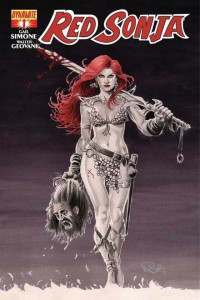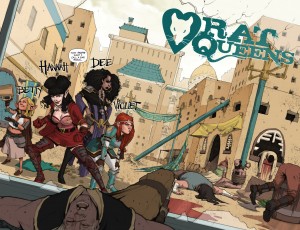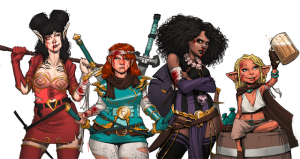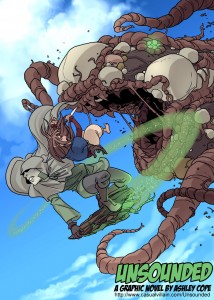The Hyrkanian Dating Scene
I imagine my blog sounds a little like your friend who has just found a new girlfriend or boyfriend right now. All going on and on about how great it is to find someone that understands you, how awesome it is to be getting someone touching your butt when you want it. In my case, of course, I’ve spent the last month going on about my rekindled love affair with comics.
Fuck if I’m going to stop now, though. Let’s talk about Gail Simone’s new Red Sonja.
The first arc of her new series, Queen of Plagues, has just wrapped up and is available here. Having followed this series since it started, I was an immense fan from the get-go. Red Sonja is a favorite heroine of mine: someone who makes absolutely no apologies for anything she does, someone who routinely forces the world to play by her rules, someone who faces a hard world and carves her own little piece of it out with a broadsword and a bad attitude.
All of this and more is on full display in Simone’s run. Aided in no small part by the amazing artwork of Walter Geovani, there’s something hugely charismatic about the way she writes Sonja’s complete unwillingness to bend to a world that demands she does. In all things does Red Sonja make her own rules: in fighting, in hunting, in copious, copious drinking…
And in sex.
That’s right. It’s another blog post about sex. I understand you might feel put off by this reveal. Beyond just tricking you into thinking I was going to spend the whole time talking about Red Sonja, this isn’t the first time I’ve written about sex in fantasy fiction and a pervasive aversion to it by readers. In fact, I seem to do it all the time, lately. You could be forgiven for getting exasperated, throwing up your hands and saying “I don’t want to talk about this!”
But because you might have that reaction (and because the subject interests me greatly), I feel that we do need to keep talking about it.
And it’s not like I’m going to stop talking about Red Sonja now. Because, actually, it’s in the most recent issue (#8) featuring a beastmaster and an awkward midnight courtship that a thought hit me that sparked this whole train of thought that led to this blog post.
I had read Red Sonja before. She’s seen a lot of iterations. And I liked the comics well enough. How could I not? “Angry woman in small clothes kills dudes with swords” constitutes maybe a quarter of the stuff I write. But something about them always failed to connect with me. Sonja seemed very…mythic, but not necessarily in the good way. She was very distant and hard to relate to. I guess that was the point. Sonja has always been about being untouchable.
Simone did a lot of new things to change that and make Sonja more approachable. And I want to emphasize that it was a lot of things (backstory, character interactions, alcoholism) that did that, so that you don’t get the impression that it was solely one thing that made Simone’s Sonja click with me. But a big part of making that connection was a simple fact.
Red Sonja had a sex life.
Not in the sitcommy sense. Sonja had desires. Sonja had whims. Sonja had agency. Sonja got lonely. Sonja got rejected. Sonja got angry.
And I remembered how many times I’ve had those same feelings. And it occurred to me that sexual identity is a much, much bigger part of a person than we probably even realized.
Sex scenes in fantasy get a bad rep. “It’s too fetishistic!” people cry out. “It’s too embarrassing!” people moan. But above all else, whenever I have this conversation on twitter, the most common complaint is this.
“It adds nothing!”
And you know? Technically, they are correct. A sex scene adds nothing.
Because the sexual aspect is already there.
It’s ingrained in humanity. It’s part of who we are. It informs a lot of our decisions (for better or worse), it drives a lot of our thinking (often for worse). And when we choose to ignore that aspect, we are not so much declining to add gratuity as we are leaving a gaping void where something should be. And that kind of thing resonates with a reader more than we might care to admit.
“Ugh,” you might groan, “you’re just campaigning for more smut!”
Sure. I like smut.
But that’s not the whole reason I’m speaking about this. Inextricable to our inability to acknowledge the sexual aspect of a character seems to be the inability to acknowledge that sexuality is a vast and multifaceted thing. I think (whether due to prejudices or past experiences), whenever someone thinks of “sex in fantasy,” someone thinks of some super gross fetish scene with lots of phallic imagery and synonyms for “dong” and “vag.”
It doesn’t always have to be. Sex is a weird thing (hence why I’m always kind of amused when people complain that sex scenes are embarrassing; of course they are, sex is an intimate, vulnerable act. It’s bound to be weird) and, just as combat scenes are different depending on whose point of view it’s in, anything of a romantic nature will have different priorities based on the character.
Not everyone is a master of the Thousand Palms. A lot of things go into the moments leading up to it. Awkward propositions, frustrated rejections, sulking in a corner, saying things you didn’t mean to; these are things that all could happen and, when they do, they will happen different for each character. Even people who identify as asexual have a struggle figuring out their own sexual identity and where they fit in with society (a good example of this is the character of Fiona from Michael Lee Lunsford’s Supernormal Step).
“Well, I agree,” some people might say, “sex scenes done well–”
And I’m going to stop you right there. That’s such a noncriticism as to be totally worthless. Of course, people enjoy a sex scene done well. People enjoy anything done well, because it’s done well. But what’s “well” for some is not well for all. We need to accept that dealing with sexuality of characters is going to be done in the author’s voice, whether you like it or not.
I guess what I’m saying is that this is something about a character that needs to be acknowledge. I’m not saying that every book needs to have a sex scene on every page or even one. I’m saying it’s super weird that a lot of authors choose not to even acknowledge that this might be something people think about.
We’ve made a lot of strides in fantasy so far. Orcs can be good. Elves can be evil. People are flawed. Fantasy has embraced this idea. We’ve not only come to expect that our heroes not be perfect, we demand it to the point that our hero can be an utter fucking bastard and still get cheers.
It strikes me as just incredibly weird that we can scoff at the idea of a hero showing a totally altruistic act, yet somehow still be perfectly okay pretending that people are not thinking about sex all the time.
The Hyrkanian Dating Scene Read More »



